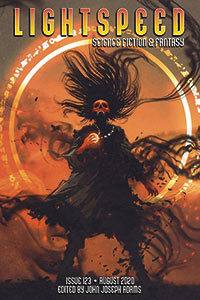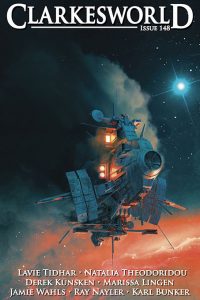Karen Burnham Reviews Short Fiction: Clarkesworld, Lightspeed, and BCS
 Clarkesworld 7/20
Clarkesworld 7/20
Lightspeed 8/20
Beneath Ceaseless Skies 7/2/20, 7/16/20
July’s Clarkesworld starts with a straightforwardly science fictional Michael Swanwick story. In “Artificial People” Raphael is an android turned on and off repeatedly as an entrepreneurial roboticist struggles to come up with a commercially successful product. Raphael loves, loses, goes to war, gets rich, and has to make some interesting decisions with the power that his later days have given him, especially given the trauma of his early life. Each of the “Three Stories Conjured from Nothing” by Shanghainese author ShakeSpace (trans. Andy Dudak) offers us a very different situation. In the first, a particular element of a vastly macroscopic computing array goes rogue, reprogramming units nearby and fighting off the efforts of the central controller to wipe them out. In the second, human observers start to see black spots in the Sun (in a world with a very different cosmological structure than our own), and in the third cosmic entities (a giant snake millions of light-years long and a lizard from an adjacent universe) have a dialog that takes billions of years to go back and forth. This story reaches for Stapledonian scope, but I struggled with the different levels of connections between the three.
Bogi Takács has a very long story here in “Power to Yield“. This is a fascinating take on aspects of power, history, personal obsession, and sadism, the latter all taking place within an asexual framework that removes those questions from their normal sexual-overtone-laden context. Oyarun is assigned a student report on an event from the history of their world. She fixates on the leader Aramin, who made a particularly bold gesture on that day. He’s still alive and their world is still pretty small, so she follows him. After a lot of research, thought, and dialog, she ends up becoming his acolyte, but he’s very up front about the fact that his acolytes, being part of his research, don’t have long life spans. He’s an asexual sadist for a justifiable cause, and she willingly signs up with him. The story has the room to cover a vast intersection of concerns, and the ending declines to deliver pat judgments on any of the characters. In a completely different story that I found equally moving, “Strange Comfort” by Tegan Moore gives us a man who had been working in a station under the icy waters of Europa. After his only crewmate is killed in an accident heading for the surface, he’s completely trapped, with only a genetically engineered Europan worm in the darkness outside for some semblance of nearby connection with a living being. Communication with the surface starts to get patchy as the program’s funding is being terminated thanks to the accident and poor returns; he’s not feeling terribly motivated to be a good minion for a dissolving corporation that obviously views him as an inconvenience. In the end, he has only strange options, none of them particularly hopeful, even the ones he can come up with himself.
The last two stories concern alien interactions with human artifacts. In “The Oddish Gesture of Humans” by debut author Gabriel Calácia, two alien researchers are speculating about the meaning of what two humans are doing in a single picture. With no other context, their speculations have as much to do with their own society, their relationship to it and to each other, as they do to anything fundamentally human. This one is short and sweet, and doesn’t overstay its welcome or overburden its premise. “The House that Leapt into Forever” by Beth Goder imagines House (a spaceship) that has been maintaining itself in the absence of its human crew and the presence of Doom-Has-Come, the only being to treat it with respect. As Doom-Has-Come has run out of food, House has to struggle between its programming and what it believes to be the right course of action (something its previously human crew would vehemently disagree with). I would put this story in the unusual category: Sweet and chilling, all at once.
The stories in August’s Lightspeed provide a number of interesting perspectives on situations that we’ve seen before. In “Still You Linger, Like Soot in the Air” by Matthew Kressel, Gil is a guru, linked (or perhaps tethered would be more apt) to an alien/god. Students seek him out to have him guide them to the gods’ wisdom, but he hates his role, even more so after what happened to the last student with whom he became particularly close. He’s disinclined to welcome the next student, completely wide-eyed and intensely eager, but her journey eventually opens up other options for him. Neither of them get what they were expecting or what they hoped for. In Katherine Crighton‘s “Sing in Me, Muse” the 15th Anisah has a role to fill, to sing status reports to Mnemosyne. She falls in love with sister Tara, and starts down a seditious path. The story is a little vulnerable to spoilers, so I won’t say more. Benjamin Rosenbaum gives us “All These Guardians of Order and Clarity, None of Them Can Abide a Free Witch“, which is really a story of conflicting stories. In one framework, Marish is a human hero and Maghd an awful witch, but we get Maghd’s take on the story. Originally abused by villagers, she grabs magical power, and while she never meant to become opposed to Marish (she had been his lover, once), she takes her power a long way before finally being defeated and captured by Djinn. That’s not the end of the story, however, and she’s still able to exercise agency over her fate in a particularly interesting way, even at the end.
Beneath Ceaseless Skies #307 starts with “Buttercream and Broken Wings” by Aimee Ogden (the first story of hers I saw this month), where Willowbright is a fairy trying to live a life independently, balanced between the Queen at court (overbearing) and humans (needy and destructive). As she gives and takes from a young human girl, we also get a glimpse of wilder fairies of the forest, suggesting an escape is possible. Next we get “Seven Dreams of a Valley” with lovely, lush writing by Prashanth Srivatsa. The narrator is a jail keeper in a place where a being of immense magical power is being held. He has a sequence of dreams about a valley, living a life there while people grow up and live whole lives while he sings to them. In the end, everything is connected in a satisfying way.
Issue #308 has a story rooted in Jewish traditions in “It Is Not From Heaven” by Jonathan Edelstein. Humble fisherman Shemaiah catches a fish that talks, and when he brings it on land magic reveals the stories it tells to be true – but they challenge approved history. This sets off immediate conflict between groups of people as they take the fish’s words to fit different agendas. Everything comes to a head at the feast of the Sparing, where Shemaiah, who had been watching things unravel, is himself called to take center stage. I appreciated “The Black-Eyed Goddess of Apple Trees and Farmer’s Wives” by Erin Eisenhour for the irreverence that is key to its main character. Bi is a very smart peasant girl who has unfortunately been chosen by divination to be sacrificed to help ward off a plague. The ritual requires purity, and if she is impure (by her own repeated admissions and actions) the priests have every intention of beating her holy. She continues to shame and shock everyone – family and priests alike – and captivates one of the guards who starts to rally to her cause. The ending is a surprise to everyone, especially to Bi, and will cause much dismay to the holy orders.
Recommended Stories
“The Black-Eyed Goddess of Apple Trees and Farmer’s Wives”, Erin Eisenhour (Beneath Ceaseless Skies 7/16/20)
“Strange Comfort”, Tegan Moore (Clarkesworld 7/20)
“Seven Dreams of a Valley”, Prashanth Srivatsa (Beneath Ceaseless Skies 7/2/20)
“Power to Yield”, Bogi Takács (Clarkesworld 7/20)
Karen Burnham is an electromagnetics engineer by way of vocation, and a book reviewer/critic by way of avocation. She has worked on NASA projects including the Dream Chaser spacecraft and currently works in the automotive industry in Michigan. She has reviewed for venues such as Locus Magazine, NYRSF, Strange Horizons, SFSignal.com, and Cascadia Subduction Zone. She has produced podcasts for Locusmag.com and SFSignal.com, especially SF Crossing the Gulf with Karen Lord. Her book on Greg Egan came out from University of Illinois Press in 2014, and she has twice been nominated in the Best Non Fiction category of the British SF Awards.
This review and more like it in the September 2020 issue of Locus.
 While you are here, please take a moment to support Locus with a one-time or recurring donation. We rely on reader donations to keep the magazine and site going, and would like to keep the site paywall free, but WE NEED YOUR FINANCIAL SUPPORT to continue quality coverage of the science fiction and fantasy field.
While you are here, please take a moment to support Locus with a one-time or recurring donation. We rely on reader donations to keep the magazine and site going, and would like to keep the site paywall free, but WE NEED YOUR FINANCIAL SUPPORT to continue quality coverage of the science fiction and fantasy field.
©Locus Magazine. Copyrighted material may not be republished without permission of LSFF.







